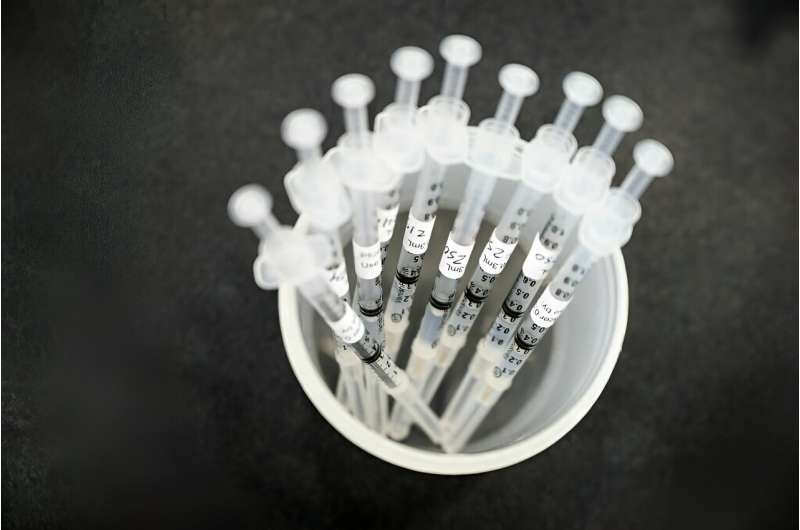This article has been reviewed according to Science X's editorial process and policies. Editors have highlighted the following attributes while ensuring the content's credibility:
fact-checked
peer-reviewed publication
trusted source
proofread
Research shows mRNA vaccine harnesses T-cell power to combat COVID-19 in lungs

The effectiveness of mRNA vaccines in reducing disease severity and hospitalization from COVID-19 is well established. Now, new research from the University of Wisconsin School of Veterinary Medicine advances our understanding of how these vaccines protect the lungs following breakthrough infections from emerging variants of SARS-CoV-2, the virus that causes COVID-19.
Published on Oct. 5 in the journal JCI Insight, the study is the first to directly demonstrate the role of memory CD8 T cells in mRNA vaccine-induced immunity to COVID-19. Memory CD8 T cells are a specialized type of white blood cell that rapidly respond when re-exposure to a pathogen occurs.
They are often referred to as "trained assassins" because they control viral infections by targeting and then destroying virally infected cells. This study, conducted in mice, shows that memory CD8 T cells were necessary and sufficient in controlling SARS-CoV-2, independent of antibodies. Researchers demonstrated this by showing how the protection afforded by mRNA vaccines was lost in mice when memory T cells were depleted prior to SARS-CoV-2 infection.
Scientists widely accept that CD8 T cells provide a more robust form of protection because the viral fragment they target to kill infected cells does not change considerably with each new viral variant. Antibodies on the other hand, typically lose their ability to prevent infection because the part of the virus they target changes with each new mutation.
Marulasiddappa Suresh, professor of immunology in the School of Veterinary Medicine Department of Pathobiological Sciences, says this study sheds new light on the protective mechanisms mRNA vaccines use to lessen severe disease following breakthrough infections. It also raises important new questions about the role of memory T cells in limiting the spread of the virus, the frequency with which we get vaccinated and the most effective methods for vaccine delivery.
"The key finding of our research shows that memory T cells play an essential role in mediating SARS-CoV-2 viral control in lungs, independent of antibodies," says Suresh, who was also the study's principal investigator. "We hope this new understanding of vaccine-induced immunity will inform the development of new vaccines and treatment strategies that more effectively combat the emergence of global variants and limit the impact they'll have on our health in the future."
While previous studies have documented a strong correlation between vaccine-induced T cells and more positive outcomes following infection with SARS-CoV-2, the ability to study these protective mechanisms in detail is not possible in humans. As a result, researchers administered various doses of the Pfizer BioNTech COVID-19 mRNA vaccine to a specialized mouse model in order to study the defining characteristics of T cell responses induced by the vaccine.
Their results showed the T cell response to mRNA vaccine in the peripheral blood is largely similar between mice and humans. They also found that T cells actively sought out the virus in the respiratory tract—airways, lung vasculature, and mediastinal lymph nodes—to effectively reduce the burden of SARS-CoV-2 in the lungs.
Other key findings show that intramuscular immunization produced unexpectedly high frequencies and numbers of memory T cells in the airways of the respiratory tract—the main portal of entry for SARS-CoV-2. According to Suresh, future research on this topic will need to assess the biological significance of nasal and airway resident memory T cells in protection against emerging variants of SARS-CoV-2 and whether individuals who recover from breakthrough SARS-CoV-2 infections will require further vaccinations.
"It's still unclear if the combination of vaccine-induced immunity and infection-induced immunity is sufficient to provide broad mutation-resistant immunity to future SARS-CoV-2 variants," he says.
Other members of the research team from the UW School of Veterinary Medicine include Brock Kingstad-Bakke, Thomas Cleven, Hailey Bussan, Hongtae Park, Peter Halfmann and Yoshihiro Kawaoka from the Department of Pathobiological Sciences; and Jay Mishra and Sathish Kumar from the Department of Comparative Biosciences. Other important contributors include researchers from the University of North Carolina, Chapel Hill; University of Tokyo; and Japan's National Center for Global Health and Medicine Research Institute.
More information: Brock Kingstad-Bakke et al, Airway surveillance and lung viral control by memory T cells induced by COVID-19 mRNA vaccine, JCI Insight (2023). DOI: 10.1172/jci.insight.172510


















